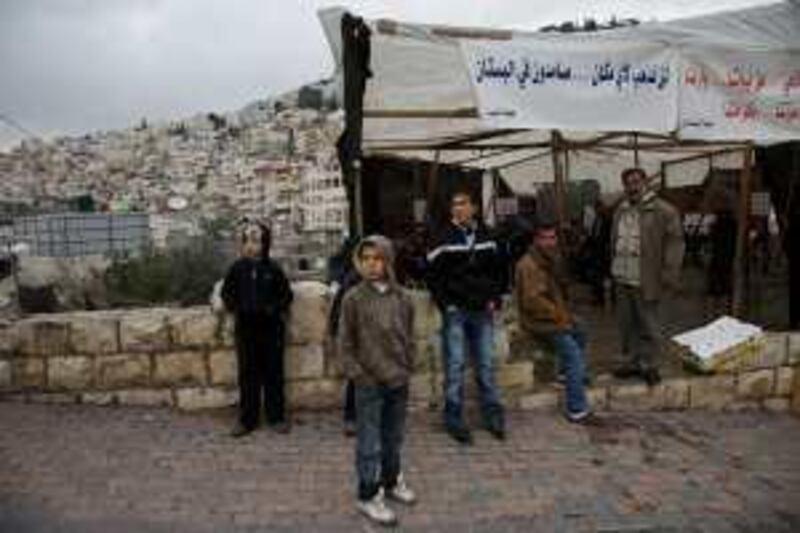JERUSALEM // It was a bitterly cold and wet morning to spend outdoors. But for those who gathered at a makeshift tent in the Bustan neighbourhood of Silwan, East Jerusalem, on Sunday morning, it is a situation they fear they may have to get used to.
"I hope it won't get to that," said Saleh Shweiki, 56, an herbologist and local resident whose house is threatened with demolition by Jerusalem's municipal authorities. "I have 13 children and with their children we are 35 people in my house." Mr Shweiki and 87 families have lived under the threat of demolition for nearly four years now. The demolition orders were handed down because, according to the municipality, the houses were built without licences in what is designated as a national park area.
Residents, human rights groups and lawyers are crying foul, however. They say the demolition orders are part of a larger Israeli scheme to make life untenable for Jerusalem's Palestinian inhabitants. In general, activists say, it is very difficult for Palestinians in Jerusalem to obtain building permits and that in many cases in Bustan, houses were built before the Israeli occupation in 1967 and hence it was not possible to obtain such licences.
"It is possible in principle for residents to get licences now," said Ziad Kawar, the lawyer who represents the 88 families. "The people are willing to get the licences and pay the fees, but the municipality wants to create a national park and does not want to give them licences." Furthermore, the City of David archaeological park that the area is meant for is funded by a controversial Israeli organisation, El Ad, which is active in promoting building in areas of occupied East Jerusalem exclusively for Jewish housing and in transgression of international law.
The archaeological park in Silwan is claimed as the site of the first settlement of the biblical King David, but the dig there, financed by El Ad, has been characterised as "bad science" by other archaeologists. Activists say there is a clear political agenda. "Silwan is an area of archaeological importance, but it is also an area where people live," said Sarit Michaeli of B'tselem, an Israeli human rights group. "What is happening now is done in order to slowly but surely prevent the local population from existing there."
The demolition orders were first handed down in 2005, but an international outcry prevented demolitions from being carried out then. A compromise was reached whereby the residents would, at their own expense, put forward a plan for the development of the area. On Feb 17, however, the municipality rejected that plan. The new mayor in Jerusalem, Nir Barkat, promised more Jewish settlement in the occupied eastern part of the city during his campaign for office. Moreover, he left Ehud Olmert's Kadima Party because he was adamantly opposed to any future division of the city.
There is also a transition at the highest level, where Benjamin Netanyahu, the leader of the right-wing Likud party, is in the process of forming a new government that, whatever its ramifications for the peace process in general, will certainly be bad news for Jerusalem's Palestinians. "There are several recent [political] developments that have brought the demolitions up again," Mr Kawar said, but "ultimately it's about racism. The municipality wants the land without the people".
A municipal spokesman rejected any accusation that the municipality was doing anything but carrying out the law. "Illegal construction is illegal construction wherever it is. There happens to be a lot concentrated in this area," said Steven Miller, a spokesman for Mr Barkat. But Ms Michaeli rejected the argument. "On the face of it, this may seem like a legal issue," she said. "But it is clear that the large-scale problem of illegal building in East Jerusalem is not because East Jerusalemites are intent on breaking the law but because Israel has created this situation in the first place."
Mr Miller conceded that the issue was politically sensitive. "It's a very sensitive issue, but the mayor moves forward with what is best for all the residents of Jerusalem." Such even-handedness is certainly not evident to Silwan natives. "This is a battle for Jerusalem, make no mistake about it," said Abed Shalode of the Popular Committee for the Defence of Silwan, a local grassroots organisation that is fighting the demolition orders.
"They [Israelis] may put different reasons for why they want these houses down to why they built Maaleh Admumim [the largest settlement in the occupied West Bank], but the aim is the same. They want Palestinians out." Mr Shalode and Mr Shweiki were busy putting up maps of the threatened homes in the solidarity tent in Bustan, rain or no rain. Local residents have been active in trying to get international visitors and media organisations to come and hear their case. They remain hopeful that, as happened before, international pressure will come to bear on Israel to desist.
This may seem less likely in the event of a far-right Israeli government coalition, but Mr Shalode remained hopeful. "There is no difference between a white dog and a black dog. They are still both dogs. Whatever the new government, we will have to fight the same battle. And I think the whole neighbourhood will fight to resist this. What choice do we have?" okarmi@thenational.ae





